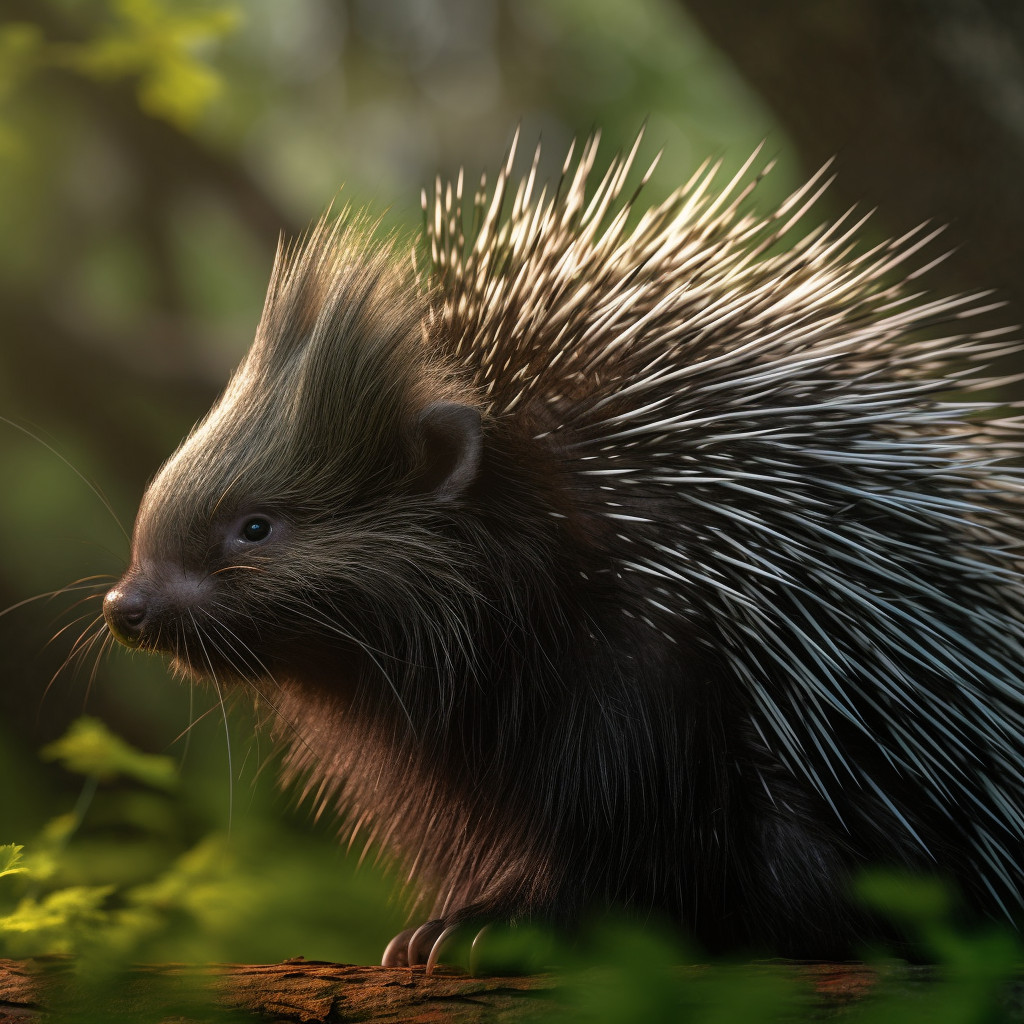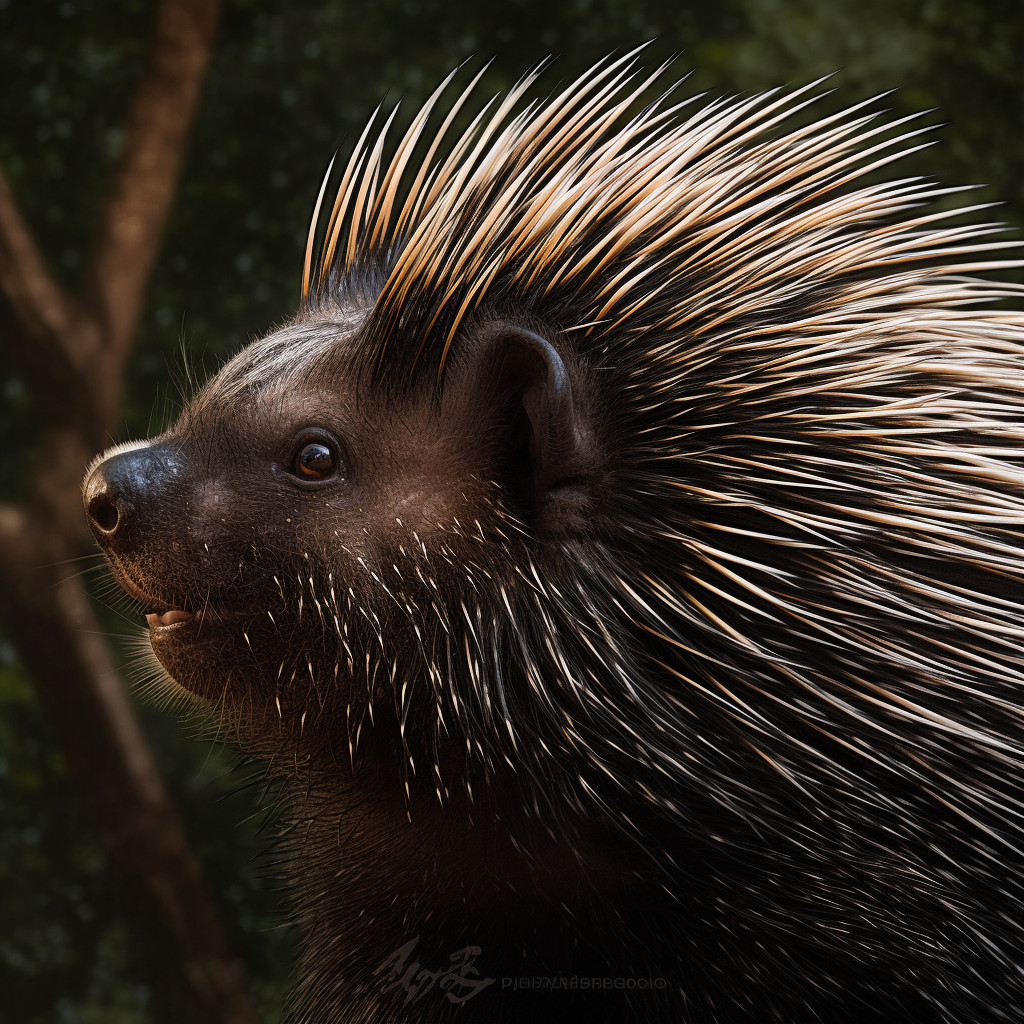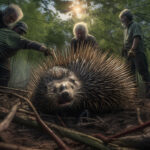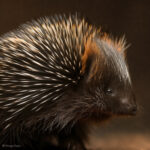Porcupines are fascinating creatures known for their sharp quills and unique appearance. However, many people wonder if these spiky animals can contract rabies. In this article, we will explore the question, “Can porcupines get rabies?” and delve into the facts surrounding this topic. We will examine the transmission of rabies, the susceptibility of porcupines to the disease, and the potential risks associated with encountering a rabid porcupine. So, let’s dive in and uncover the truth about porcupines and rabies.
Key Takeaways
- Porcupines can get rabies, but it is rare.
- Rabies transmission in porcupines is usually through bites from infected animals.
- It is important to avoid contact with wild porcupines to minimize the risk of rabies transmission.
- If you suspect a porcupine has rabies, contact local wildlife authorities for assistance.
Understanding Porcupines: A Brief Overview

Porcupines are fascinating creatures that inhabit various regions around the world. In this section, we will explore their natural habitat, behavior, and debunk some common misconceptions about these prickly mammals.
A. Porcupine’s Natural Habitat and Behavior
Porcupines can be found in a variety of habitats, including forests, grasslands, deserts, and even rocky areas. They are adaptable creatures and can thrive in different environments. These nocturnal animals are primarily herbivores, feeding on a diet consisting of leaves, bark, twigs, and even fruits.
One interesting fact about porcupines is their ability to climb trees. They have strong claws and a prehensile tail that helps them maneuver through branches with ease. This arboreal behavior allows them to access food sources that may be out of reach for other animals.
When it comes to their behavior, porcupines are generally solitary creatures. They prefer to live alone or in small family groups. They are not aggressive by nature and will usually try to avoid confrontation. However, if threatened, porcupines have a unique defense mechanism – their quills.
Porcupines have sharp, barbed quills covering their bodies, which they can raise when feeling threatened. Contrary to popular belief, porcupines cannot shoot their quills, but they can release them upon contact. These quills are designed to penetrate the skin of predators, causing pain and discomfort. Once embedded, the quills are difficult to remove, often leading to infection.
B. Common Misconceptions About Porcupines
There are several misconceptions surrounding porcupines that are worth addressing. One common misconception is that porcupines carry rabies. However, this is not entirely accurate. While porcupines, like any mammal, can contract rabies, it is extremely rare.
Rabies is a viral disease that affects the nervous system of mammals, including humans. It is primarily transmitted through the bite of an infected animal. While porcupines can contract rabies, they are not considered a significant reservoir for the disease. The main carriers of rabies are typically carnivorous animals such as raccoons, bats, and foxes.
It is important to note that if a porcupine were to contract rabies, it would exhibit symptoms similar to other infected mammals. These symptoms include aggression, disorientation, excessive salivation, and paralysis. If you encounter a porcupine displaying these symptoms, it is crucial to avoid any contact and report the sighting to local wildlife authorities.
To prevent the spread of rabies, it is essential to vaccinate domestic pets, such as dogs and cats, as they can come into contact with wildlife. Additionally, practicing caution around wild animals, including porcupines, is always advisable. Avoid approaching or attempting to handle them, as this can lead to unnecessary risks.
In conclusion, porcupines are intriguing creatures with unique characteristics. While they can contract rabies, it is rare for them to do so. Understanding their natural habitat, behavior, and dispelling common misconceptions allows us to appreciate these fascinating animals and coexist with them safely.
Can Porcupines Carry Rabies?

A. The Reality of Rabies in Porcupines
Rabies is a viral disease that affects the central nervous system of mammals, including humans. It is primarily transmitted through the bite of an infected animal. While many people associate rabies with dogs and bats, it is essential to understand the potential risks associated with other animals, such as porcupines.
Porcupines are fascinating creatures known for their quills and unique appearance. However, can they carry rabies? The answer is yes, but it is important to note that the occurrence of rabies in porcupines is relatively rare.
Rabies in porcupines is not as prevalent as in other animals, such as raccoons or skunks. This is because porcupines are not typically aggressive animals and tend to avoid confrontation. However, there have been documented cases of porcupines testing positive for rabies, albeit infrequently.
It is crucial to remember that just because a porcupine can carry rabies does not mean that every porcupine is infected. The risk of encountering a rabid porcupine is relatively low, but it is still essential to exercise caution when dealing with any wild animal.
B. Factors Contributing to Rabies in Porcupines
Several factors contribute to the occurrence of rabies in porcupines. Understanding these factors can help shed light on the transmission and prevalence of the disease in these animals.
-
Rabies Transmission: Rabies is primarily transmitted through the saliva of an infected animal, usually through a bite. Porcupines are not aggressive animals and tend to use their quills as a defense mechanism rather than biting. However, if a porcupine were to bite another animal or a human, there is a potential risk of transmitting the virus.
-
Wildlife Diseases: Porcupines, like other wild animals, can come into contact with various diseases, including rabies. They may encounter infected animals while foraging for food or exploring their habitat. This contact increases the risk of contracting the virus.
-
Porcupine Behavior: Porcupines are solitary animals that prefer to avoid confrontation. They are not known for aggressive behavior, which reduces the likelihood of them contracting rabies. However, if a porcupine were to become infected, its behavior might change, potentially leading to increased aggression and a higher risk of transmitting the virus.
-
Rabies Prevention: The best way to prevent the spread of rabies in porcupines is through vaccination. Vaccinating domestic animals, such as dogs and cats, helps create a barrier between the virus and wildlife populations. This indirectly reduces the risk of porcupines contracting the disease.
In conclusion, while porcupines can carry rabies, the occurrence of the disease in these animals is relatively rare. It is crucial to exercise caution when encountering any wild animal, including porcupines, to minimize the risk of exposure to rabies. Vaccination programs for domestic animals play a vital role in preventing the spread of the disease to wildlife populations. By understanding the factors contributing to rabies in porcupines, we can better protect ourselves and these fascinating creatures.
Identifying Rabies in Porcupines
A. How to Tell if a Porcupine Has Rabies
Rabies is a viral disease that affects the nervous system of mammals, including porcupines. While porcupines can contract rabies, it is relatively rare for them to do so. However, it is still important to be able to identify if a porcupine has rabies, as it can pose a risk to humans and other animals.
Here are some signs that can help you determine if a porcupine has rabies:
-
Unusual Behavior: Rabies can cause significant changes in an animal’s behavior. If you observe a porcupine acting unusually aggressive, disoriented, or exhibiting erratic movements, it could be a sign of rabies.
-
Loss of Fear: Porcupines are generally shy and will try to avoid human contact. If you come across a porcupine that seems unafraid of humans or displays unusually bold behavior, it could be a red flag for rabies.
-
Excessive Salivation: Rabies can cause excessive drooling or foaming at the mouth. If you notice a porcupine with a significant amount of saliva around its mouth, it could be a symptom of the disease.
-
Paralysis: As the disease progresses, rabies can lead to paralysis in infected animals. If you observe a porcupine that is unable to move or has difficulty walking, it could be an indication of rabies.
If you encounter a porcupine that displays any of these signs, it is crucial to keep a safe distance and avoid any direct contact. Remember, rabies is a serious disease that can be transmitted through bites or scratches, so it is essential to exercise caution.
B. Recognizing Porcupine Rabies Symptoms
While porcupines may exhibit similar symptoms to other animals when infected with rabies, there are some specific signs to look out for:
-
Changes in Behavior: Rabies can cause porcupines to display abnormal behavior. They may become more aggressive or exhibit uncharacteristic actions such as wandering aimlessly or attacking without provocation.
-
Difficulty Walking: As the disease progresses, porcupines may experience weakness or paralysis in their limbs, making it challenging for them to move normally.
-
Excessive Salivation: Rabid porcupines may have an excessive amount of saliva around their mouths, leading to drooling or foaming.
-
Loss of Appetite: Infected porcupines may lose interest in food and exhibit a decreased appetite.
-
Disorientation: Rabies can cause confusion and disorientation in porcupines. They may appear disoriented, stumble, or have trouble maintaining balance.
If you come across a porcupine displaying these symptoms, it is crucial to report it to the appropriate wildlife authorities or animal control agency. They can take the necessary steps to assess the situation and ensure the safety of both humans and animals.
Remember, it is always best to observe wildlife from a safe distance and avoid any direct contact. If you suspect a porcupine or any other animal may have rabies, it is essential to prioritize your safety and the well-being of others by seeking professional assistance.
The Risk of Rabies Transmission from Porcupines

A. Can You Get Rabies from Porcupine Quills?
Porcupines are fascinating creatures with their spiky quills and unique appearance. However, one concern that often arises is whether porcupines can transmit rabies to humans through their quills. Let’s delve into this topic and understand the risk of rabies transmission from porcupines.
Rabies is a viral disease that affects the central nervous system of mammals, including humans. It is primarily transmitted through the saliva of an infected animal, usually through a bite. While rabies is commonly associated with animals such as dogs, bats, and raccoons, it is essential to understand the risk posed by porcupines.
Porcupines, like any other mammal, can contract rabies if they come into contact with an infected animal. However, it is crucial to note that porcupines are not known to be primary carriers of the rabies virus. In fact, cases of rabies in porcupines are extremely rare.
The risk of contracting rabies from porcupine quills is minimal. The virus is primarily present in the saliva of an infected animal, and the quills themselves do not carry the virus. Therefore, if you happen to get pricked by a porcupine quill, you do not need to worry about rabies transmission.
B. Do Porcupine Quills Carry Rabies?
Porcupine quills are sharp, barbed structures that serve as a defense mechanism for these creatures. While they may cause pain and discomfort if they penetrate the skin, it is essential to understand that porcupine quills themselves do not carry the rabies virus.
Rabies is primarily transmitted through the saliva of an infected animal. The virus is present in high concentrations in the saliva, allowing it to enter the bloodstream through a bite or open wound. However, the quills of a porcupine do not contain saliva or any bodily fluids that could transmit the virus.
It is important to note that if a porcupine is infected with rabies, it is typically through a bite from another infected animal. The virus does not reside in the quills themselves. Therefore, if you come into contact with porcupine quills, there is no risk of contracting rabies from them.
C. Can a Dog Get Rabies from Porcupine Quills?
Dogs are curious creatures, and encounters with porcupines can sometimes lead to painful quill injuries. If your dog happens to tangle with a porcupine, you may be concerned about the risk of rabies transmission.
While porcupines can contract rabies, it is important to note that the risk of a dog getting rabies from porcupine quills is extremely low. As mentioned earlier, the quills themselves do not carry the rabies virus. The primary mode of transmission is through the saliva of an infected animal.
However, it is still crucial to monitor your dog for any signs of illness or infection after an encounter with a porcupine. If your dog has been bitten by a porcupine, it is advisable to seek veterinary attention to ensure proper care and treatment.
In conclusion, the risk of rabies transmission from porcupines, whether through their quills or direct contact, is minimal. While porcupines can contract rabies, cases of rabies in porcupines are rare. It is always important to exercise caution and seek medical attention if you or your pet have been in contact with a potentially infected animal.
The Role of Vaccination in Rabies Prevention
A. Can You Get Rabies from a Vaccinated Puppy?
Vaccination plays a crucial role in preventing the spread of rabies, not only among humans but also among our furry friends. When it comes to puppies, it’s essential to ensure they receive the necessary vaccinations to protect them from this deadly virus.
Rabies is primarily transmitted through the bite of an infected animal, and it affects the central nervous system. While puppies can contract rabies, it is highly unlikely for a vaccinated puppy to develop the disease. Vaccines work by stimulating the immune system to produce antibodies that fight against the rabies virus.
Vaccinating puppies at the appropriate age and following the recommended vaccination schedule is vital. Puppies typically receive their first rabies vaccine at around 12-16 weeks of age, followed by a booster shot a year later. This initial vaccination primes their immune system to recognize and respond to the rabies virus, providing them with long-term protection.
It’s important to note that no vaccine is 100% effective, and there is always a small chance of a vaccinated puppy contracting rabies. However, the risk is significantly reduced compared to an unvaccinated puppy. Additionally, if a vaccinated puppy does come into contact with a rabid animal, the vaccine helps to minimize the severity of the disease and increase the chances of survival.
B. Importance of Vaccination for Pets Exposed to Porcupines
Porcupines are fascinating creatures that can be found in various parts of the world. While they are not known to be carriers of rabies, it is still crucial to ensure that our pets, such as dogs and cats, are up to date with their vaccinations, especially if they have encountered a porcupine.
Pets can be curious and may approach or even attempt to play with a porcupine. This can lead to painful quill injuries, which may require medical attention. However, the risk of rabies transmission from a porcupine is minimal.
Rabies is most commonly transmitted through the saliva of an infected animal, typically through a bite. Porcupines are not known to be reservoirs for the rabies virus, meaning they do not typically carry or transmit the disease. However, it’s important to remember that any wild animal can potentially carry rabies, so it’s always better to err on the side of caution.
By keeping our pets up to date with their rabies vaccinations, we provide them with an added layer of protection. Vaccines help to stimulate their immune system, enabling them to fight off the rabies virus if they were to come into contact with it. This is particularly important for pets that live in areas where wildlife, including porcupines, are prevalent.
In conclusion, while porcupines are not known to carry rabies, it is still essential to prioritize the vaccination of our pets. Vaccines are a crucial tool in preventing the spread of rabies and protecting our furry companions from this deadly disease. By staying proactive and ensuring our pets are up to date with their vaccinations, we can provide them with the best possible protection against rabies and other potential health risks. Conclusion
In conclusion, while it is technically possible for porcupines to contract rabies, the likelihood is extremely low. There have been very few documented cases of porcupines with rabies, and they are not considered a primary carrier of the disease. Rabies is more commonly found in mammals such as bats, raccoons, skunks, and foxes. However, it is always important to exercise caution and avoid contact with any wild animal, including porcupines, as they can carry other diseases and may become aggressive if they feel threatened. If you come across a porcupine or any other wild animal that is acting strangely or appears sick, it is best to contact your local animal control or wildlife authorities for assistance. Remember, prevention is key when it comes to rabies, so make sure to keep your pets up to date on their vaccinations and avoid unnecessary contact with wildlife. Stay safe and informed!
Frequently Asked Questions
Can porcupines carry rabies?
Yes, porcupines can carry rabies. However, it’s relatively rare because porcupines are not typically aggressive and have limited interaction with other animals due to their solitary nature.
How to tell if a porcupine has rabies?
A porcupine with rabies may exhibit unusual behavior such as aggression, disorientation, excessive salivation, and difficulty moving. However, these symptoms are not exclusive to rabies and could indicate other health issues. It’s best to contact a wildlife professional if you suspect a porcupine may be infected.
Do porcupines have rabies?
Porcupines can contract rabies, but it’s not common. Rabies in porcupines is less prevalent compared to other wild mammals like raccoons, skunks, and bats.
Can porcupines get rabies?
Yes, porcupines can get rabies from the bite of another infected animal. However, due to their solitary lifestyle and defensive quills, they are less likely to contract the disease.
Can you get rabies from porcupine quills?
Rabies is typically transmitted through the saliva of an infected animal, usually via a bite. It’s unlikely to contract rabies from a porcupine quill unless it was contaminated with the animal’s saliva or neural tissue.
Can you get rabies from a vaccinated puppy?
No, you cannot get rabies from a vaccinated puppy. The rabies vaccine effectively protects the puppy from the disease, and therefore it cannot transmit the virus.
Do porcupine quills carry rabies?
Porcupine quills do not inherently carry rabies. However, if a porcupine is infected with rabies and its quills come into contact with its saliva, there could be a risk of transmission.
Can porcupines have rabies?
Yes, porcupines can have rabies, but it’s not a common occurrence due to their solitary behavior and defensive mechanisms.
What are the symptoms of rabies in porcupines?
Symptoms of rabies in porcupines can include unusual aggression, disorientation, excessive drooling, and difficulty moving. However, these symptoms can also be indicative of other health issues.
Can a dog get rabies from porcupine quills?
While it’s unlikely, there is a small chance a dog could get rabies from porcupine quills if the porcupine was infected and the quills were contaminated with its saliva. To prevent this, it’s important to keep dogs vaccinated and away from wildlife.




